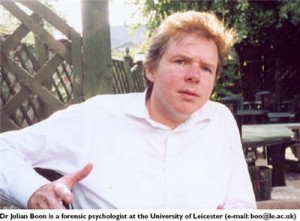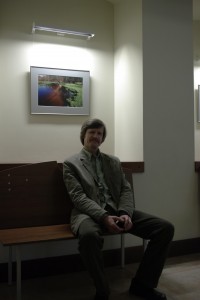Dr. Julian Boon is a senior lecturer and forensic psychologist at the University of Leicester, United Kingdom.
 A viewpoint is presented which argues that while forensic/legal/investigative psychology has over the decades generated large amounts of research – this has not necessarily yielded corresponding results in terms of applicable output. Utilizing by way of illustrations offender case examples, an alternative scientific approach (e.g. Bhaskar 2002 ) is advocated as being better for the purpose of furthering forensic psychology’s objectives. This ‘Realist’ approach is geared to the real-world phenomena which, it is argued, is at the essence of forensic psychology’s concerns. It is argued that such a paradigm-shift – from that of the current Empiricist approach in UK/USA – would better serve the interests of future, forensic psychology research agendas. It is further argued that such a move would be to the very significant mutual benefits of the forensic academic, practitioner, and police communities.
A viewpoint is presented which argues that while forensic/legal/investigative psychology has over the decades generated large amounts of research – this has not necessarily yielded corresponding results in terms of applicable output. Utilizing by way of illustrations offender case examples, an alternative scientific approach (e.g. Bhaskar 2002 ) is advocated as being better for the purpose of furthering forensic psychology’s objectives. This ‘Realist’ approach is geared to the real-world phenomena which, it is argued, is at the essence of forensic psychology’s concerns. It is argued that such a paradigm-shift – from that of the current Empiricist approach in UK/USA – would better serve the interests of future, forensic psychology research agendas. It is further argued that such a move would be to the very significant mutual benefits of the forensic academic, practitioner, and police communities.
Philip Howard is a Senior Research Officer, OASys Data, Evaluation and Analysis Team from National Offender Management Service, United Kingdom.
The Offend er Assessment System (OASys) was launched in England and Wales in 2001, and large sets of assessment data have now been studied by the OASys research team of the National Offender Management Service. Assessment data can be linked with reoffending data, and assessment histories can be studied to show how offending-related needs change over time. This presentation summarises research in these areas, and explains the practical implications of the findings. In reoffending research, the original OASys score has been replaced by predictors of general and violent reoffending, named OGP and OVP, which have much greater predictive validity. Survival analysis has shown that offenders are most likely to reoffend at the start of community supervision, then become gradually less dangerous. Analysis of assessment histories shows that some OASys items are much more likely to change than others. Combining reoffending and change data shows that changes in offending-related needs and therefore OGP and OVP scores are genuinely predictive of changes in the likelihood of reoffending.
er Assessment System (OASys) was launched in England and Wales in 2001, and large sets of assessment data have now been studied by the OASys research team of the National Offender Management Service. Assessment data can be linked with reoffending data, and assessment histories can be studied to show how offending-related needs change over time. This presentation summarises research in these areas, and explains the practical implications of the findings. In reoffending research, the original OASys score has been replaced by predictors of general and violent reoffending, named OGP and OVP, which have much greater predictive validity. Survival analysis has shown that offenders are most likely to reoffend at the start of community supervision, then become gradually less dangerous. Analysis of assessment histories shows that some OASys items are much more likely to change than others. Combining reoffending and change data shows that changes in offending-related needs and therefore OGP and OVP scores are genuinely predictive of changes in the likelihood of reoffending.
Prof. habil. dr. Viktoras Justickis is a professor at the Mykolas Romeris University, Lithuania.
I am a practicing lawyer and researcher of Law. I have published a number articles and several books on different aspects of Law. Psychology (especially, forensic, applied psychology, psychotherapy) has been one area of my research and teaching.My general feeling in joining Law with Psychology is one of ambivalence.
As a practicing lawyer I am aware how imperfect, inconsistent, and ineffective current law practice and outcomes are. As a psychologist, I can see the contribution Psychology could make in improving actual and perceived outcomes. The point is that real people practice the law and real people are those to whom the law is applied. Thus the more law corresponds to their thoughts, feelings, attitudes, perception, personality and relations, the more efficient and humane it is and appears to be. So the law needs psychological input. It is psychology that can inform the law and legal process about what real people are really like.
This means that in the theory the law, essentially, needs psychology. However, in reality, there are no long lines of jurists waiting for an appointment to see a psychologist. On the contrary, there is a paradoxical resistance of law against psychology (V. Justickis. Does the Law Use Even a Small Proportion of What Legal Psychology has to Offer. 2008).Therapeutic jurisprudence (TJ) is a very good example to discuss, on the one side, how much the law needs psychology and on the other side, how intensively it resists it. The point is that TJ is one of the most intensive attacks of current psychology against the formal, non-human ways of the modern law. It is also one of many attempts to help the law become more humane, more efficient,less cruel and counter- productive to good order. This provided a good opportunity to review sources of resistance within the law against TJ and to discuss possible strategies to overcome this resistance.
Prof. dr. Gintautas Valickas is a Head of the Department of General Psychology at the  University of Vilnius, Lithuania. His research interests are: procedural justice, secondary victimization, coping with stress, law enforcement officers’ selection and consultation.
University of Vilnius, Lithuania. His research interests are: procedural justice, secondary victimization, coping with stress, law enforcement officers’ selection and consultation.
The therapeutic jurisprudence (TJ) is an interdisciplinary field of science focusing on traumatic effects of the modern cold and formalistic justice upon the mental health of people participating in it.
TJ aims to make the legal system humanistic, warm, attentive to human feelings. During the last two decades TJ attracted great interest and has contributed to legal reforms in many countries.
The presentation focuses upon resistance of legal system to its humanization by TJ. The main reason behind this resistance is the difference in aims of the legal system and TJ. The leading goals of the first one are social stability, justice, representation of interests of the nation and its single social and political groups.
The leading aim of the TJ is the protection the psychic health of participants of the legal process. Depending on the social and legal context, interrelation of the aims of a legal system and of TJ can be different: congruent under one circumstances or conflicting in different ones.
Based upon different relations between aims of the legal system and TJ, a new “two direction conception”. This conception provides a typology of problems that arises applying TJ ideas for humanization of some law. The first type of situations in which TJ is applied are those in which the aims of TJ are congruent with ones of law. It these situation application of TJ enriches the legal system making its action more consistent and helping the law to fulfill its mission in the most consistent way. The second type are situations in which both conflicts. Implementation of TJ meets resistance of the legal system. The relative significance of both has to be assessed and the optimal ways of their integration should be found.

